Gabinete do primeiro-ministro:
Secretário de Estado Adjunto do primeiro-ministro, Filipe Baptista.
Ministério da Administração Interna:
Secretário de Estado Adjunto e da Administração Local, Eduardo Cabrita.
Secretário de Estado Adjunto e da Administração Interna, José Magalhães.
Secretário da Administração Interna, Ascenso Simões.
Sub-Secretário de Estado da Administração Interna, Fernando Rocha Andrade.
Ministério dos Negócios Estrangeiros:
Secretário de Estado dos Negócios Estrangeiros e da Cooperação, João Gomes Cravinho.
Secretário de Estado dos Assuntos Europeus, Fernando de Oliveira Neves.
Secretário de Estado das Comunidades Portuguesas, António Braga.
Ministério das Finanças:
Secretário de Estado Adjunto e do Orçamento, Manuel Baganha.
Secretária de Estado do Tesouro e Finanças, Maria dos Anjos Capote.
Secretário de Estado dos Assuntos Fiscais, João Amaral Tomás.
Secretário de Estado da Administração Pública, João Figueiredo.
Ministério da Presidência:
Secretário de Estado da Juventude e do Desporto, Laurentino Dias.
Secretário de Estado da Presidência do Conselho de Ministros, Jorge Lacão.
Ministério da Defesa Nacional:
Secretário de Estado da Defesa Nacional e dos Assuntos do Mar, Manuel Lobo Antunes.
Ministério da Justiça:
Secretário de Estado Adjunto do Ministro da Justiça, José Conde Rodrigues.
Secretário de Estado da Justiça, João Tiago Silveira.
Ministério do Ambiente, do Ordenamento do Território e do Desenvolvimento Regional:
Secretário de Estado do Ambiente, Humberto Rosa.
Secretário de Estado do Ordenamento do Território e das Cidades, João Ferrão.
Secretário de Estado do Desenvolvimento Regional, Rui Baleiras.
Ministério da Economia e da Inovação:
Secretário de Estado Adjunto da Indústria e da Inovação, António Castro Guerra.
Secretário de Estado do Comércio, Serviços e Defesa do Consumidor, Fernando Serrasqueiro.
Secretário de Estado do Turismo, Bernardo Trindade.
Ministério da Agricultura, do Desenvolvimento Rural e das Pescas:
Secretário de Estado Adjunto da Agricultura e das Pescas, Luís Vieira.
Secretário de Estado do Desenvolvimento Regional e das Florestas, Rui Nobre Gonçalves.
Ministério das Obras Públicas, Transportes e Comunicações:
Secretário de Estado Adjunto das Obras Públicas e das Comunicações, Paulo Campos.
Secretária de Estado dos Transportes, Ana Paula Vitorino.
Ministério do Trabalho e da Solidariedade Social:
Secretário de Estado da Segurança Social, Pedro Marques.
Secretário de Estado do Emprego e da Formação Profissional, Fernando Medina.
Secretária de Estado Adjunta e da Reabilitação, Idália Moniz.
Ministério da Saúde:
Secretário de Estado da Saúde, Francisco Ventura Ramos.
Secretária de Estado Adjunta e da Saúde, Carmen Pignatelli.
Ministério da Educação:
Secretário de Estado Adjunto e da Educação, Jorge Pedreira.
Secretário de Estado da Educação, Valter Lemos.
Ministério da Ciência, Tecnologia e Ensino Superior:
Secretário de Estado da Ciência, Tecnologia e Ensino Superior, Manuel Heitor.
Ministério da Cultura:
Secretário de Estado da Cultura, Mário Vieira de Carvalho.




